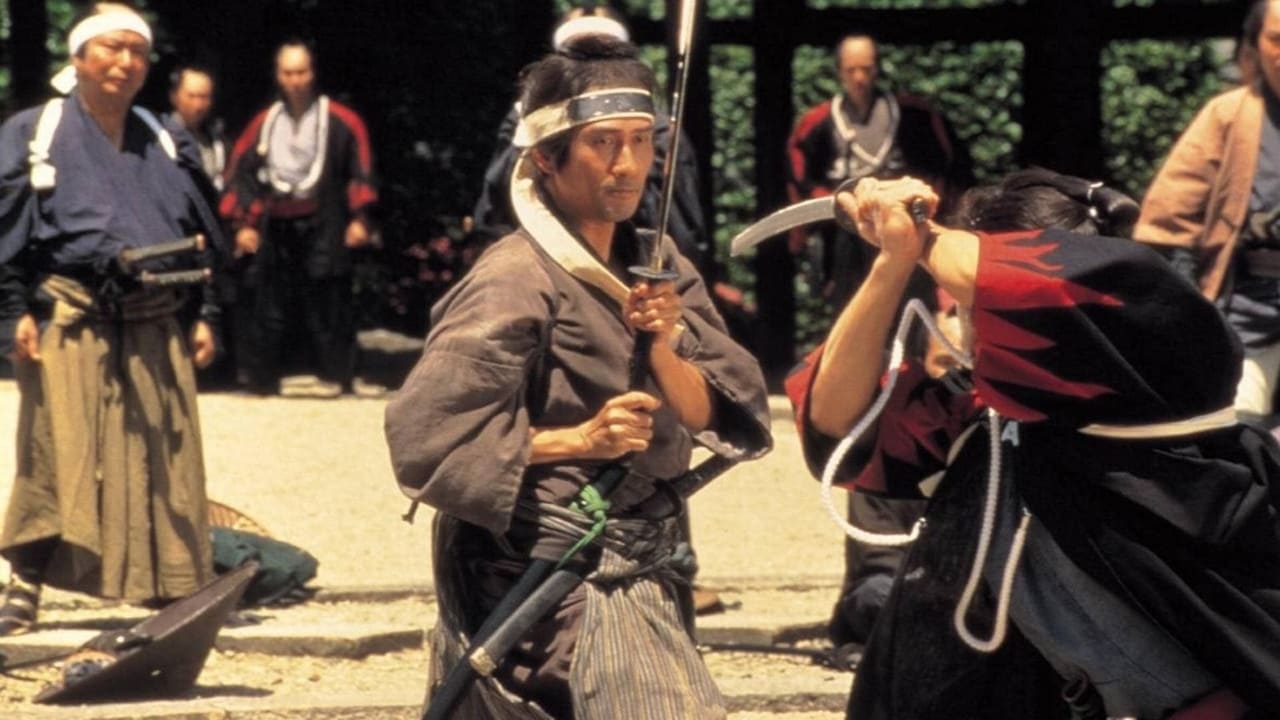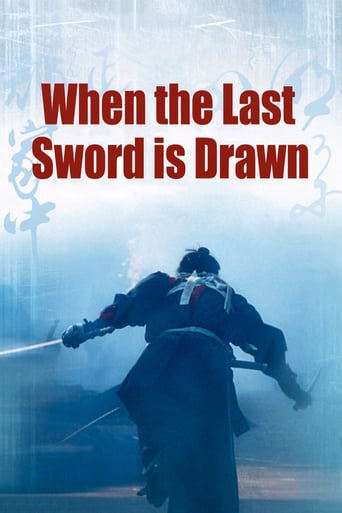

Beginning in 1899, ageing samurai Saito (Koichi Sato) brings his child into a doctor's office. While the doctor's wife tends to the sick child, Saito and the doctor, Ono (Takehiro Murata), begin talking when Saito notices a photograph of his old colleague and master Yoshimura (Kiichi Nakai). Saito begins to tell his story from his first meeting with Yoshimura, a gifted swordsman, during the era of the Tokugawa shogunate. Yoshimura has brought shame on himself by leaving his small town clan after realising he cannot support his family, in order to join the Shinsengumi, a samurai police force that is slowly building a reputation and small army. Seen as a miser and a clown, Yoshimura slowly gains respect due to his loyalty to his clan, and his fresh outlook on life, just as war approaches.Rarely have I seen a movie shift in quality so much as When the Last Sword is Drawn. After a solid, exciting and intriguing first 70 or so minutes, the tone of the film shifts so drastically for the remainder that it threatens to completely ruin what preceded it. Winding down into a seemingly endless conveyor belt of emotional and highly sentimental scenes, the film quite frankly becomes a bore, and often feels like it's trying to desperately squeeze tears out of you. Although the performances are impressive (especially lead Nakai), the script is so chocked full of clichés that this becomes redundant.Yet the film as a whole does have much to admire, as it explores themes of loyalty and family, and asks whether you can ever truly know someone. Sairo and Ono both have their sides of the story to tell, and have slightly conflicting memories of Yoshimura. Often his character can betray his own beliefs, creating conflicts within his personality, whether this is to show how memory can betray you, or the complexity of the human character I don't know, but Yoshimura is a fascinating character, and different to the usual brooding samurai. This would have been a very good film had it been shaved by about thirty minutes, or didn't spend so much time on tearful goodbyes and sentimental monologuing, But director Yojiro Takita is intent, and the film sadly doesn't have the scope or the quality to justify its 140+ running time.www.the-wrath-of-blog.blogspot.com
... View MoreMovies in general are never as tightly put together as a well read book, nor should they be because the images are what invoke our memories days later. Mibu Gishi Den is such a work and Kiichi Nakai, gives an award winning performance in the lead. You may remember him for his portrayal of Takeda Shingen in the year long NHK series. For this blue-blood actor, Nakai had to reach for this part, right down to the accent that brings home the country Nanbu Samurai. The beautiful northern Japan area that we get glimpses of in a few of the newer Japanese productions like Twilight Samurai. From Sendai to Karumai, the land and the women are fine enough to keep any combat engineer close to home. The old class system and the wrenching poverty that it kept in place rarely shows through in film. Today people can't relate to either one, here The Last Sword takes several looks at this through the friendships of the protagonist Yoshimura and his close "friend" the Taisho Ono who surely gets booted to the top of the class.Koichi Sato showed range as the reminiscent grandpa, as Best supporting actor his portrayal of Saito is grand enough to reprise in his work a year later in NHK's Shinsengumi (http://www.nhk.or.jp/taiga/) where he plays the antagonist co-leader Kamo Serizawa. Yuji Miyake has an "American Pie" father quality about him. Here he grows up to be the leader of the Morioka clan who supports the losing era. Actually there are no winners here in the era where the seeds of world globalization are planted. It is mostly American Civil war weapons that make the sword impotent. This movie captures a time when a different culture could be found over the next mountain. The real winners here, were the sweep it made at the Japanese Academy awards and the folks who see this film.
... View MoreI cried for the last 45 minutes of the film.... I am a grown up man, but the tears wouldn't stopJust wanted to share this with you, before you watch this movieIf you want to watch sword fights, mighty battle scenes - there is something in this movie for you, too, but above all it is about love and duty. It is so strange how "Mibu gishi den" starts with artful swordsmanship and then at one point we get deeper into the souls of the main characters and from then on, although there will be many fierce battle scenes its all about the emotions and the battle within, the fire that drives the hearts to their destinyThe movie is shot well - we don't get to see much of a scenery, but it kind of got me closer to the characters, kept me following the story line, which is developed so well - I love stories where not all the action is focused on the main character, but now and then there are hints of the feelings and emotions of some of the lesser important characters too, almost invisible, but if you pay attention it pays back wellI guess, now that I recapitulate on the movie I can write a lot more about it, but - just watch it. It is a very good, I would say - important movie. After all the Chinese clichéd movies that followed "Tiger And Dragon", this Japanese movie is a beautiful gem, that everyone should enjoy10 out of 10peace and love
... View MoreThis was a beautiful movie, yet a difficult one to watch. The main character, played very well by Kiichi Nakai, is a man of the land. He loves his country and his family and he is also a samurai. That puts him into a very uncomfortable position when money is too scarce for his family to be able to survive. He then does the dishonorable thing, he leaves the clan in order to earn money for his family.The story in itself is the message of the movie, with all its details, not the main storyline. The action is placed in the time when samurai are being replaced with gun powder and Japan is in great turmoil. In the end, he returns to his homeland and restores honor to his family, so it's a circular kind of tale, but in the meanwhile, you see how different people, in different situations and social classes, react, how friendships are made and unmade.What makes this movie better than most is the way the main character is constructed. He is far from the cliché of the samurai, a lot more human. If this could have been told in a shorter way, everyone would have been happier, though. While the last scenes are heartbreaking, they are also too theatrical for my taste.I have seen Twilight Samurai compared with this movie. I do think that TS was better, but this is still a very good movie.
... View More